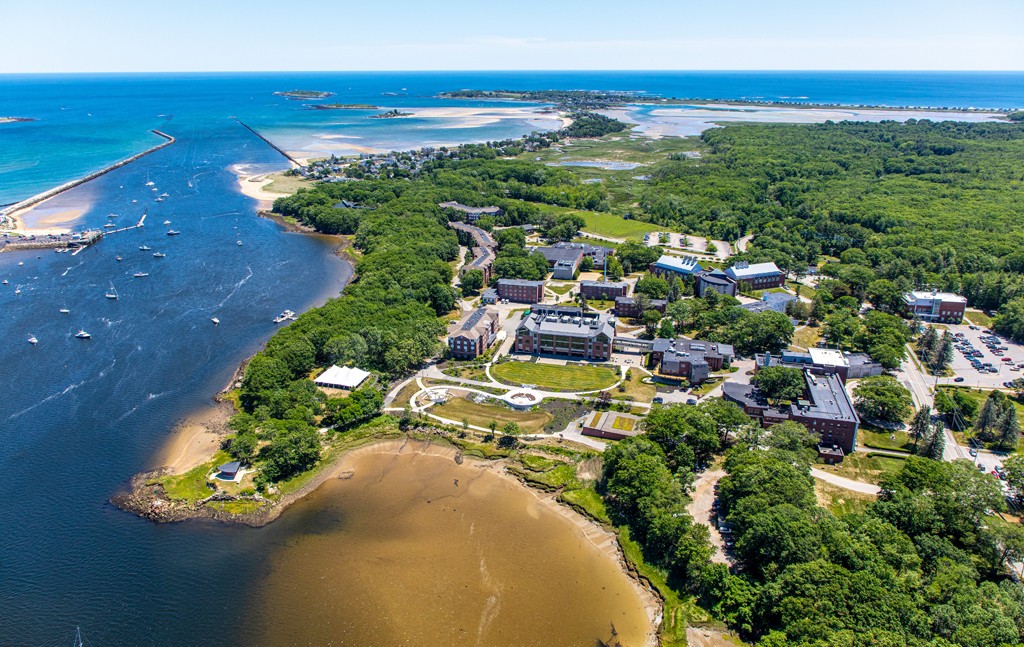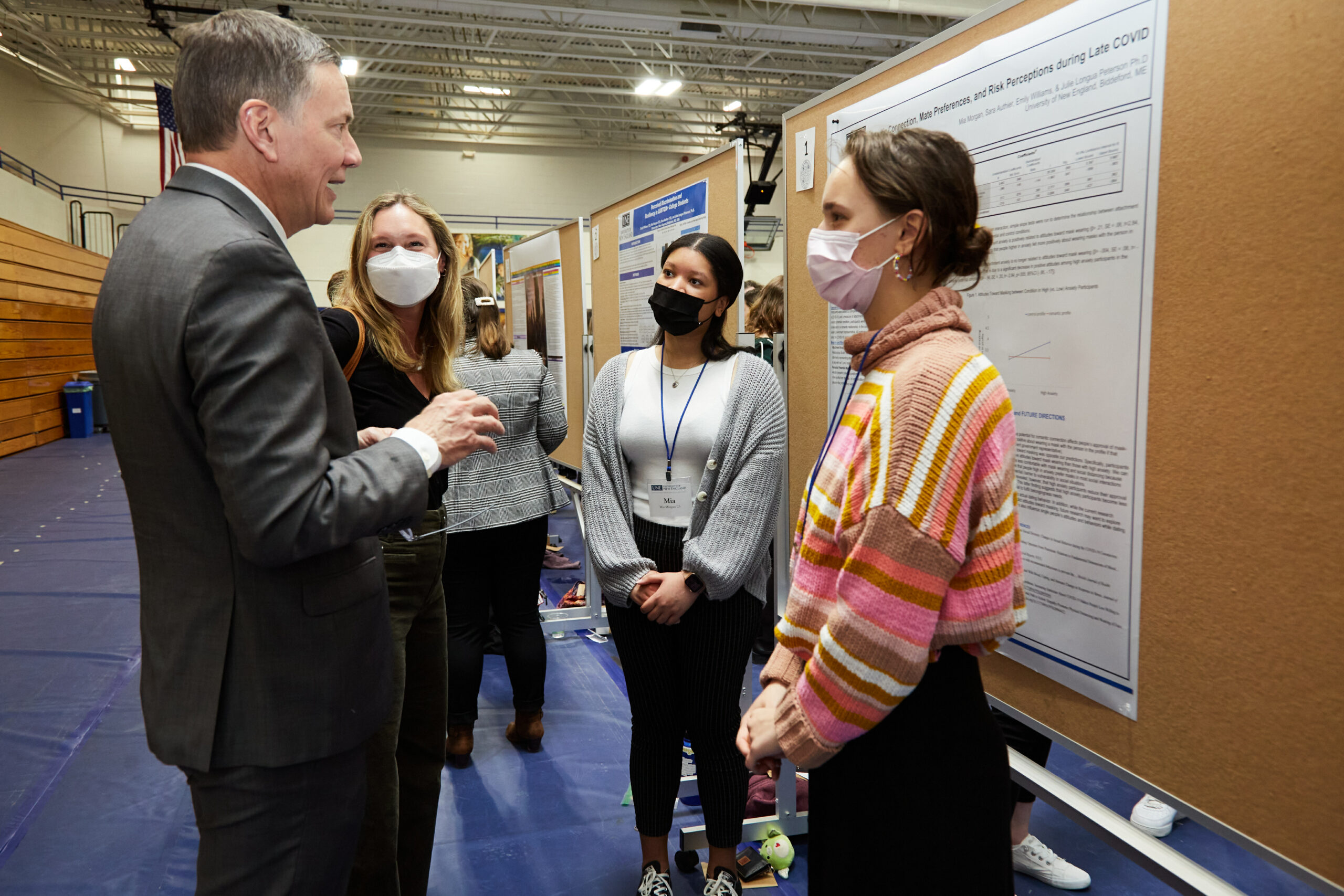The best of three worlds exists at the University of New England. Its two central campuses in Maine boast very distinct personalities—one a marine paradise nestled on the ocean in Biddeford and the other a quintessential, health-driven campus with a quaint quad in Portland. Its location in the spectacular Tangier, Morocco, allows for one heck of a study abroad experience that attracts many of its students.
Still, while it has received pockets of notoriety since the completion of a merger in 1987, it really hasn’t emerged as a leading regional institution until the past few years. But this small R2 led by graduate and professional students is now the largest private college or university in Maine. It also has the only medical school in the state and the only dental school in northern New England. Its Portland location soon will house a $100 million medical school facility that will make its health campus the biggest in all of New England, even ahead of the esteemed Boston institutions.
James Herbert, who has been overseeing the physical and academic changes as president for the past five years, talks about what makes UNE so unique. “What we’re known for is sort of bridging the gap between career-ready skills and a deep foundation in the liberal arts and in what we call critical habits of mind,” he says. “We’re sort of an odd duck. We don’t fit neatly into any box. From one point of view, we look like a small-to-medium liberal arts college. From another angle, we look like a big health sciences university. But we provide more value-added than any other institution in Maine.”
He notes that UNE is “defying the odds” by growing enrollment as a private institution in New England, where its competitors are falling off by around 5%. In fact, it is poised to welcome the largest class in its history this fall. Herbert’s infusion of the “marketplace of ideas” concept is helping spur that growth, part of a five-year strategic plan at UNE that will culminate next year. “It’s a place where you can do innovative things,” Herbert says. “So many universities are tradition-bound, but we can move pretty quickly and do some things outside of the box. That’s what I like about being here.”
A former vice provost and director of psychology at Drexel University, he is constantly thinking and tinkering about next steps for UNE and its place in the world. He has spoken before Congress on the national shortage of health care workers and had one of his hundreds of works blessed by the Dalai Lama. In terms of the future of higher education, he shared a few of those in a recent conversation with University Business. He says there are four critical areas that his university is working on that institutions must embrace in order to thrive over the coming decades:
Interdisciplinary connections: Herbert says, “The true innovations happen at the intersection of disciplines. The problem is that within academia, we tend to gravitate towards disciplinarity. You have to be constantly mitigating against that and finding creative ways to break down barriers, break down silos and have people work together across disciplines. Nowhere are the forces toward disciplinarity stronger than in health care. It tends to be very siloed. And that has big implications for our entire health-care system. That’s what we’re trying to address.”
UNE, for example, has embraced a model called interdisciplinary education, or IPE, which breaks down those barriers by placing students in cohorts to learn about the different health disciplines. Herbert says UNE is trying to change the siloed culture in clinics and hospitals, where shortages exist but where specialists dominate and patients often see a multitude of physicians in a single hospital setting. “There’s research showing that this model improves patient outcomes, reduces medical errors and reduces provider burnout.”
Blending career-ready with fundamental habits of mind: On the merits of blending liberal arts with career-ready skills, Herbert says, “If you talk to any parent, I don’t care if the kid goes to a community college or they go to Harvard, they want their kid to be prepared with good career-ready skills. But a lot of colleges eschew a focus on career-ready skills because they think that’s too technical or beneath them. That’s what students and families are demanding. At the same time, if all you do is prepare students for their first job, then you’re really doing them a disservice because the world is changing so fast. You have to be in a constant state of evolution and upskilling. We have to inculcate students with what we call the habits of mind to be able to prepare them—things like a deep sense of curiosity, critical thinking, numerical literacy, statistical reasoning, cultural humility and communication skills.”
Discourse across differences: UNE has forged several initiatives to try to foster civil dialogue, including The President’s Forum, where it invites speakers with different perspectives to campus on the same stage, as well as a similar lecture series through its Global Center for Humanities, which purposely tries to spark dialogue. “Our society has become more politically polarized than at any time since the Civil War,” Herbert says. ‘We are living increasingly in ideological bubbles. People are living in these alternative realities. We’ve lost trust in institutions. We’ve lost a sense of shared values. Importantly, we’ve lost the ability to communicate across differences. The disturbing thing is this has happened profoundly at universities. Universities should be precisely the place where we have these tough conversations and entertain thoughts from a variety of perspectives.
“We’ve planted a flag at UNE and said the university should be the ultimate marketplace of ideas. We have an obligation to create an environment where we have the hard conversations, but we do it in a constructive way. We’re saying, let’s be kind and let’s be thoughtful and civil, but let’s not shy away from robust conversations about race, gender identity, and most hot-button issues. One of the important things I’ve done with deans and faculty is that when they get pushback from students, we have their back, as long as they’re doing it in good faith. I think more presidents need to go public and to make that declaration.”
Harnessing technology: Herbert says there are positives and negatives to the transformation happening related to tech at institutions. “There are really cool tools on the horizon that are going to be very powerful. But there’s also a dark side. Social media can be a very dangerous tool if you’re not careful. There’s a whole contingent of faculty who have gotten used to doing everything by Zoom. So there’s an erosion of office culture. We’re starting to see some negative effects of that. Certainly, elbows get sharper. Collaboration is harder. As we move closer toward generalized AI, we’re going to face all kinds of ethical things that we need to be thinking about now. We need to figure out how to use technology to our advantage and to anticipate the negative effects.”
Working toward achieving those goals, Herbert has high aspirations for his own campuses. “We just revamped our undergraduate curriculum and the integration of career-ready skills that will allow us to reframe the Biddeford campus as more traditional, residential. Once we move the med school [to Portland], it’s going to be a game-changer in terms of our ability to really take the IPE model to the next level. Right now, every student who comes to UNE health sciences gets IPE training. But I want that to be much deeper. I want every single student who comes here to get deep training in telehealth, as well. I think we can become the nation’s foremost leader in healthcare education, to address the issues of rural and aging populations.”
More from UB: The President Series
- Minerva: A look at the world’s most innovative university
- Florida Gulf Coast: From Dunk City to world impact, the rise of FGCU
- Holy Cross: Tradition reigns, but change has been positive
- University of Oklahoma: A flagship university that is changing lives on campus
- Western New England:Â What is a new traditional university and why is the vision so vital?
- Midland: Small university continues to be ‘relentlessly relevant
- Purdue: Growth tied to keeping students at center of bulls-eye
- Muhlenberg:Â Leading the way as pioneers for women
- Stetson:Â Why kindness has been one of the keys to Stetson’s success
- Waubonsee CC: Remaining relevant requires deep focus on students, employees
- Dominican: Providing support for first-gen students
- Rockland CC: Is this a time of opportunity for community colleges?
- University of Montana:Â How higher ed can work for veterans
- Quinnipiac: Creating partnerships and lifelong learning



